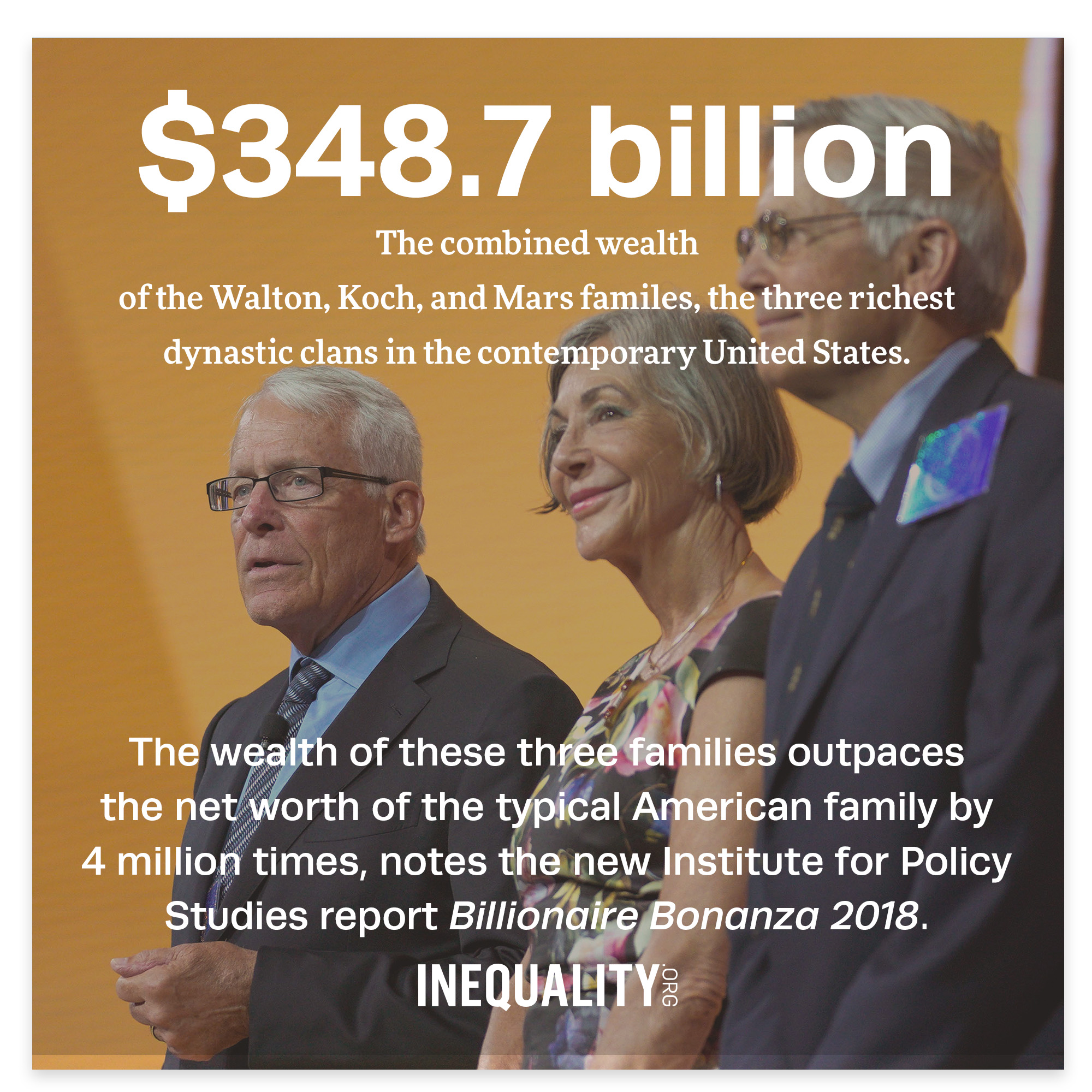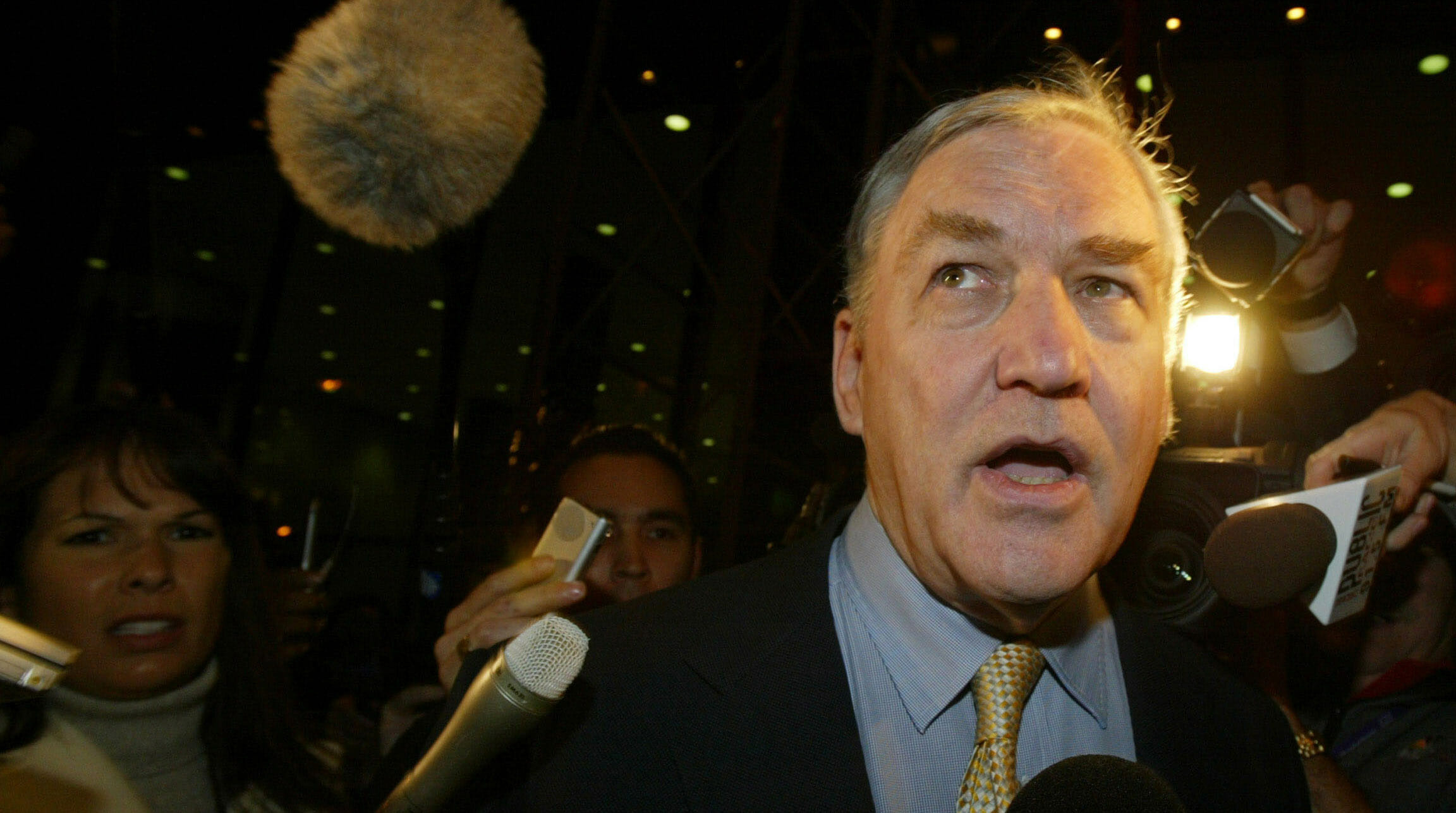Sheldon Adelson and his fellow billionaires have been rigging the rules to favor wealth for some time now. And the consequences could hardly be more dire.
|
THIS WEEK
|
Tomorrow’s election will be the most expensive midterm to date, with candidates, political parties, and outside groups spending more than $5 billion to plug their preferred politicians. Over $100 million of that sum comes from casino magnate Sheldon Adelson, who knows that tipping the political scales in his favor can return him many times those millions.
Adelson and his fellow billionaires have been rigging the rules to favor wealth for some time now. And the consequences could hardly be more dire, as my colleague Josh Hoxie and I detail in our new report, Billionaire Bonanza 2018: Inherited Wealth Dynasties in the 21st-Century U.S. The wealth of just three American families – the Waltons, the Kochs, and the Mars – has gone up by 6,000 percent since 1982, even as median household wealth, inflation adjusted, has decreased over the same period. More this week on those numbers, and what they mean for our politics.
Chuck Collins, for the Institute for Policy Studies Inequality.org team |
|
|
|
|
INEQUALITY BY THE NUMBERS
|
 |
|
|
|
|
|
|
FACES ON THE FRONTLINES
|
 |
Teachers Promise a Show of Power at the Polls
|
| When teachers in West Virginia went on strike earlier this year, they sparked a national movement for justice in the classroom. That movement is continuing on at the polls, propelling teachers and their allies towards more political power. Nearly 1,500 current or former educators are running for state office, according to the National Education Association, and thousands more are galvanized as part of a grassroots organizing effort pushing for drastic priority shifts in state politics. Negin Owliaei has more. |
|
|
|
|
WORDS OF WISDOM
|
 |
|
|
|
|
|
PETULANT PLUTOCRAT
OF THE WEEK
|
 |
| This Banker Might Want to Prescribe Sleeping Pills |
| Heinrich Adami runs the UK operations of Banque Pictet & Cie, the Swiss private bank that manages over $500 billion worldwide of rich people’s money. Adami, an equity partner in the bank, rates as handsomely rich himself, and these days he’s feeling the pain of his fellow UK affluent. The possibility of the Labour Party’s Jeremy Corbyn becoming Britain’s next prime minister has them all out of sorts. Corbyn, Adami told his bank’s annual dinner last week, has become not just “very dangerous for big fortunes,” but “one of the main issues our clients are losing sleep over.” What has the rich so tossing and turning? Leaders and activists in Corbyn’s Labour Party are talking about new wealth taxes, giving workers ownership stakes in the companies where they work, and denying government contracts to British corporations that pay their top execs over 20 times what they pay their workers. |
|
|
|
|
GREED AT A GLANCE
|
 |
|
|
|
|
|
|
TOO MUCH
|
 |
| Mouthy Moguls: Our Latest Disappearing Species |
| What do America’s billionaires feel about the burning issues of the day? They’d rather not say — in public. In private, they let their billions do the talking. So what should activists campaigning for social decency do in response? Go begging for a bigger chunk of those billions — or go after the billionaires who hold them? Three political scientists from Northwestern University have some interesting new research that bears on that question. Inequality.org co-editor Sam Pizzigati, author of The Case for a Maximum Wage, has more about their work. |
|
|
|
|
|
|
MUST READS
|
Read our Inequality.org Midterm Election preview: The ballot initiatives, candidates, campaign finance trends, and voter turnout angles we're watching.
This week on Inequality.org
Amee Chew, Luxury Development Is Making Our Housing Crisis Worse. Developers tout increased building as a salve for rising rents, lining their pockets while driving cycles of displacement.
Bob Brownstein, The Price of Innovation for Silicon Valley’s Workers. If we want tech growth to create widespread prosperity, we need to shift the rules that determine who reaps the benefits.
Maia Szalavitz, Net Worth v Self Worth: Do We All Need Inequality Therapy? A growing body of research indicates that extreme inequality is driving an obsession with status that no one can win.
Jessicah Pierre, Trump Returns to an Old Formula: Lies and Hatred. The president is putting up a dirty fight to maintain GOP control in Congress.
Jim Hightower, These Ballot Measures Could Bring More Democracy to Your State. Corporate elites have become so afraid of democracy that they're actually trying to outlaw it.
Elsewhere on the web
Michelle Alexander, What If We’re All Coming Back? New York Times. Reflections on the “veil of ignorance” thought experiment of philosopher John Rawls: How equal a future society would you like to see if you had no idea of what your place in that society would be?
Chuck Collins, The wealth of America's three richest families grew by 6,000% since 1982. Guardian. The expansion of dynastic wealth pushes us further toward a society governed by the rich.
Kalena Thomhave, What Taxing the Rich Could Yield, American Prospect. America’s wealthiest families could make a huge contribution to our social well-being.
Thomas Ferguson, Paul Jorgensen, and Jie Chen, Big Money — Not Political Tribalism — Drives US Elections, Institute for New Economic Thinking. New research suggests that 57.16 percent of the contributions to federal election campaigns comes from the top .01 percent of donors.
Why and how investors can respond to income inequality, Principles for Responsible Investment. A new UN agency report explores the corporate structures exacerbating income inequality and looks at how institutional investors might encourage new business frameworks.
Benjamin Page, Jason Seawright, and Matthew Lacombe, What billionaires want: the secret influence of America’s 100 richest, Guardian. The results of a 10-year political science study.
Kari Paul, Wealth gap for minorities in the U.S. has continued to widen post-recession, MarketWatch. New research from New York University.
Sendhil Mullainathan, You’ve Become Rich. That Doesn’t Mean You’re Great at Everything, New York Times. The rich do not just benefit from their own wealth. They benefit from our mistaken perceptions. |
|
|
|
|